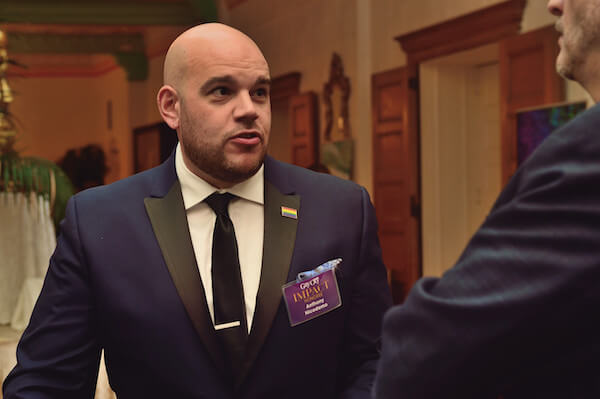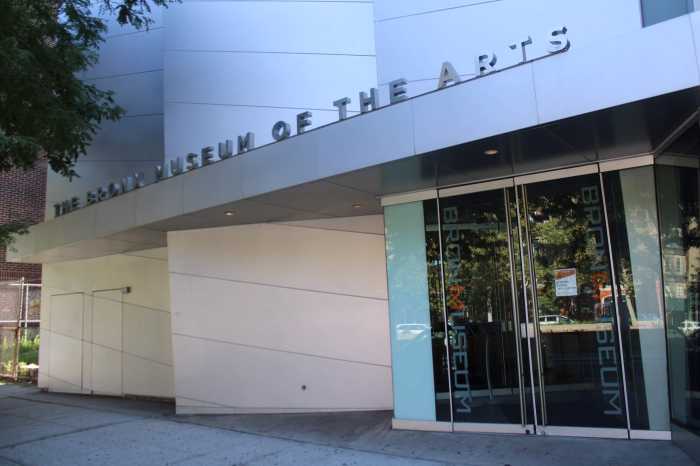B.J. Ward bares Marshall; Powell’s redawning; a diva assoluta at Carnegie
As much as we adore Sondheim, Porter, and Gershwin, it’s always great to hear new songs by uncelebrated writers, and such is the case with “B.J. Ward Sings Marshall Barer” at Feinstein’s at the Regency, October 31 and November 7. Lyricist Barer (1923-1998) should be more widely known today, and not only for his most famous work, “Once Upon a Mattress.” Singer Ward described him as “brilliant, bipolar, bisexual, and bi-coastal,” all of which is proved by his witty, tender, excruciatingly smart work.
Ward’s new CD, “Michael Feinstein Presents B.J. Ward Sings Marshall Barer,” is a delightful introduction to his work, in which she gives joyous, warm-toned interpretations of his songs and an hilarious, touching running commentary on his life. Barer could be both deliciously outrageous and meltingly sensitive. His gay protest song, “Something Unknown,” is typical of the man, not a strident anthem by any means, but a subtle, poignantly affecting call for empathy:
“Practical advice like take it slow, think twice/ might very well suffice for some/But such as we who choose to see/what others do refuse to see/Who brave the night to save the right to heed a different drum/For us the time has come.”
“He was always a hippie,” Ward remembered in an interview, “always helping people out, even strangers right off the street you’d wonder about. Although Sondheim and Cole Porter were admirers of his, his career never became as successful as it could have been. He would collaborate with various composers and even recycle lyrics he’d already used, which did not endear him to many in the business. He wrote the ‘Mighty Mouse’ cartoon theme, something he wasn’t especially proud of, but claimed he wrote on the cab ride uptown to the recording session. But that was Marshall—a total individual! He was exceedingly handsome in his youth, and almost married Mary Rodgers—Richard Rodgers’ daughter and his ‘Once Upon a Mattress’ collaborator—but somehow never was lucky in love.”
Ward’s husband, Gordon Hunt, directs the show, as he did her “Stand Up Opera,” saying, “It’s mostly a matter of editing and shaping the material.” Hunt’s daughter, by a previous marriage, is Helen Hunt, and both he and Ward are full of praise for her.
“I was in the front row when she won her Oscar,” the father recalled. “What a wild night that was. I never pushed her into being an actress. She went out and did it on her own from the time she was a child.”
Hunt and Ward met when he was directing cartoons for Hanna-Barbera and she was the voice of Betty Rubble in “The Flintstones” and Velma in “Scooby Doo.”
“In those days,” Ward recalled, “we had cartoon voice veterans like Mel Blanc and June Foray still working, which was fabulous. When Mel died, they had to hire seven different people just to do all of his voices.”
Ward’s resume also includes a stint in the ‘60s as a Playboy Bunny—“It was innocent compared to Hooters’”—and her popular act, “Stand Up Opera,” in which she makes use of her training, up to a high E flat, and pokes loving fun at the grandest art’s more outré aspects. She was also a Las Vegas backup singer for Ann-Margret, whom she described as “the most loving, sweetest person, not anything like that incredible sex kitten she becomes on stage.”

By all means, do not miss the best play in town, “Walking Down Broadway,” at the Mint Theatre, through November 6. It was written by a great, largely unknown American writer, Dawn Powell (1896-1965), and is only now receiving its world premiere. Penned in 1931, its canny insights and bracing energy remain as timelessly fresh as when she penned it. Thanks to the efforts of her biographer Tim Page, Powell has been enjoying a deserved revival with the publication of her novels, plays, and diaries. All of them are marked by an elegance of prose, level-headed honesty and rare empathy, with her novels reading like modern Manhattan variants of Balzac’s “Human Comedy” cycle, while the plays have far more real wit and humanity than many of those by her more celebrated contemporaries Eugene O’Neill, Moss Hart, and George S. Kaufman. No one wrote about New York better than she did, and one can only wonder at the chauvinism of the literary and theatrical community, which kept her from the success she deserved.
Burdened by financial worries, she sold the rights to this play to Hollywood, and a film, “Hello, Sister,” was made in 1933, directed by no less than an uncredited Erich von Stroheim. Sadly, the movie, while retaining something of Powell’s spunky spirit, bears little relation to the original material.
The play is about two lonely, scared girlfriends (Christine Allbright and Amanda Jones), newly arrived in New York from Ohio, who bring home two young men (Denis Butkus and Ben Roberts) they’ve just picked up on the street. Steven Williford‘s direction has an attention to period and emotional detail that is revelatory, and he has cast the entire thing to scrumptious perfection. Allbright and Butkus are truly star-crossed, the most romantic stage couple in many a moon, kindred souls in their radiant innocence and shaky, Big City facades of sophistication. Jones deliciously evokes the young Susan Strasberg. Powell, in the typically uncondescending, loving embrace she had toward all genuine souls, has Cherene Snow, as a maid, observing, “A man ain’t going to ask anybody to marry him—what’s he want to get married for if he’s having a good time? A woman’s got to work on ‘em, make ‘em think they’re somethin’ they’re never goin’ to be—why, when I’m workin’ on a new man I don’t draw a natural breath until it’s all legal and the rent and electricity bills come in his name… I’m working on number six right now, they’s a lot of things about number five don’t suit me, right down to the ground.”
“Diva” is a title all too loosely thrown around today, but at Carnegie Hall on October 15, Renee Fleming fully earned not only that, but the designation “Diva Assoluta” as well, in Richard Strauss’ “Daphne.” It was an evening of hard-core opera dementia—from the moment Eike Wilm Schulte, as the comprimario First Shepherd, walked onstage and let fly with the most thrilling baritone tones, Fleming almost seemed to stare at him with the thought, “So it’s going to be that kind of night, is it?” The bar was instantly raised very high, and everyone involved met it with complete triumph, from Semyon Bychkov drawing every conceivable value, both thunderous and delicate, out of the magnificent WDR Symphony Orchestra Cologne to contralto Anna Larsson, who, besides giving powerful, elemental voice as Earth Mother Gaia, gave every woman present a true lesson in the art of the curtsey during the oceanic ovations. Although tenor Johan Botha as Apollo looked nothing like a god, he certainly sounded like one, negotiating the stratospheric tessitura with authentic heldentenor bravura.
But it was really all about Fleming, and those ravishing torrents of sound she kept unleashing, like yards and yards of cream velvet.
Contact David Noh at Inthenoh@aol.com.
gaycitynews.com





































